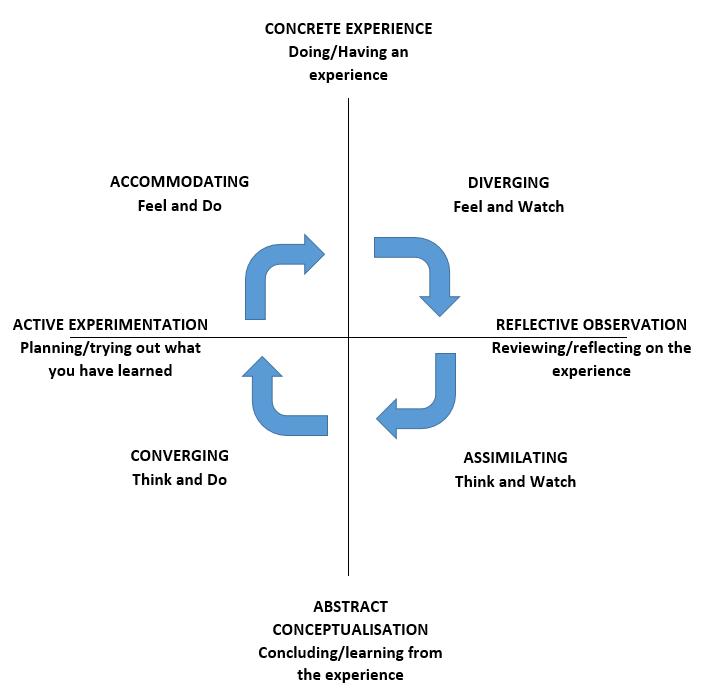Learning is Everything: Learning Never Ends
Your role as a manager coach is to enable ongoing learning amongst your team members (both collectively and individually), and this necessitates ongoing learning on your part. We all learn differently, and we learn best when we seek learning in accordance with our own learning styles. Our team members learn best when we help them firstly to become aware of their preferred learning style, and secondly when we pitch our coaching conversations in accordance with these styles.
David Kolb introduced us to his learning styles in 1984, and he describes 4 distinct learning styles that are described here: https://www.simplypsychology.org/learning-kolb.html. It is not the purpose of this article to explain the 4 learning styles, but to discuss how you can use your understanding of your own and other people’s learning styles in a practical way.
Essentially, Kolb proposes that there are 4 learning styles:
- Those who learn by feeling and watching (Diverging) – these are people who gather information and form ideas from different points of view; they are interested in people and like to gather ideas and information; they struggle to move into specific action because there are so many possibilities;
- Those who learn by thinking and watching (Assimilating) – these are people who value ideas and concepts over people; they spend a lot of time understanding something and often put themselves under pressure to know everything before they will do anything;
- Those who learn by thinking and doing (Converging) – these are problem solvers who use their learning to solve practical problems (often technical ones) and enjoy experimenting with new ideas; they may avoid tackling interpersonal or social issues ;
- Those who learn by feeling and doing (Accommodating) – these are people who tend to take a practical and experiential approach to solving problems, and tend to be quite comfortable diving into action based on gut instinct and a willingness to experiment in pursuit of solutions; they will follow other people’s views or ideas rather than thinking things through for themselves, including thinking about possible consequences.
There are a couple of really useful instruments that will raise your awareness of your own learning style – so that you can pursue learning approaches that both resonate with your style, and address the limitations.
The Learning Style Inventory (follow this link) is a really useful instrument for becoming more aware of your and your team members’ preferred learning styles. When you are coaching team members, shared awareness of their preferred learning style opens up the possibility of an interesting discussion about how you might best enable their learning. It will also make you aware of your own tendency to coach or teach in line with your own learning style rather than the preferred style of the other. Furthermore, you will be able to ask powerful questions that challenge the limitations of each style. For example:
- Ask the divergent learner what specific action they will take and when;
- Ask the assimilating learner what will make them feel safe enough to take action without having yet become an expert;
- Challenge the converging learner to apply their minds to interpersonal or interdepartmental problems; and
- Challenge the accommodating learner to bring their own thinking (including consideration of possible consequences and actions to mitigate these) to the discussion, rather than just using other people’s ideas.
Just as the coachee learns from every coaching session, so too does the coach. But this is not enough. Coaches (including Manager Coaches) are the enablers of continuous learning in others. How can they pursue this with integrity if they are not lifelong learners themselves? This requires genuine curiosity – which really is the quality of being comfortable with not knowing everything or having all the answers; comfortable with the idea that you are always learning and always interested in developing your knowledge and understanding – including an interest in other people and their views on the world.
The most effective learning happens when all four aspects of Kolb’s learning cycle are put into conscious practice – where you and your team member pay attention to all four parts of the cycle (see below):
- Concrete experience: what happened?
- Reflective observation: what meaning do you make of this?
- Abstract conceptualisation: what have you learned from this?
- Active experimentation: what could you do now? What will you do now?
- Concrete experience: what happened when you took the action you had decided upon?
- And repeat the cycle for continuous learning.
So think about how you might raise your awareness of and challenge the limitations of your own learning style, and apply this to what you are currently learning. Also, make some decisions about how you and your team members might become increasingly aware of their preferred learning styles.
Resources:
https://www.simplypsychology.org/learning-kolb.html
https://www.businessballs.com/self-awareness/kolbs-learning-styles/
http://www.bunbury.wa.gov.au/pdf/environment/u472/Appendix%2019%20U472%20Community%20Facilitator%20Kolb%20Questionnaire%20Final.pdf
http://med.fau.edu/students/md_m1_orientation/M1%20Kolb%20Learning%20Style%20Inventory.pdf


 RSS Feed
RSS Feed


